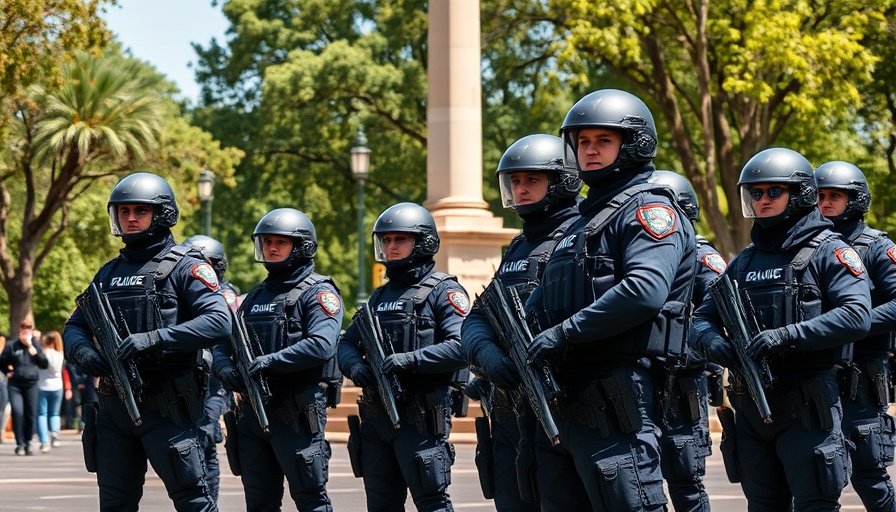
Trump’s Tensions with Maryland: A Strained Political Landscape
In the latest move that escalates tensions between President Donald Trump and Democratic governors, Trump has threatened to send military troops to Baltimore, Maryland, amidst a verbal spat with Governor Wes Moore. This announcement came after Moore extended an invitation to Trump to discuss public safety initiatives in Baltimore, a city often mired in perceptions of crime and socio-economic challenges.
Context of Military Deployment: What It Means for Americans
Trump's intentions to deploy military forces to urban areas are not entirely new. Earlier, he had signaled Chicago and New York as potential next targets for his controversial law enforcement strategy, which has already seen thousands of National Guard troops patrolling the streets of Washington, D.C. The ongoing situation raises vital questions about the implications of militarizing police responses in America. This tactic reflects deeper issues of public safety management, as well as the balance between state and federal powers.
Public Safety or Political Maneuvering? Diverse Perspectives on Crime
Democratic leaders and community advocates have expressed deep concerns about Trump's approach. Critics contend that sending troops into cities like Baltimore could escalate tensions rather than resolve them. Governor Moore emphasized the need for collaboration and conversation rather than military presence, asserting that effective dialogue must focus on the real, complex issues affecting crime in Baltimore.
On the other hand, Trump maintains that his actions aim to tackle crime head-on, arguing that his deployment of troops resulted in a necessary tightening of security in areas affected by crime. His statements imply that cities led by Democrats, which he often critiques for their policies, fail to effectively manage crime rates.
Future Predictions: The Impending Effects of Military Deployment
The prospect of military troops in cities raises questions not only about public safety and law enforcement but also about the future of citizen-police relationships. Could the introduction of military presence in urban settings disrupt community trust? What precedent does this set for federal intervention in local matters?
As political analysts assess these developments, some predict that Trump's hardline approach could galvanize opposition among voters who prioritize community solutions over federal intrusion. In turn, this might energize grassroots movements pushing for reforms centered on social justice and local empowerment.
Risk Factors and Challenges Revealed by Military Action
The looming challenge is multifaceted: while some residents may welcome increased security, others fear the implications of an armed presence on their streets. The discourse should consider the psychological toll on communities already grappling with crime, poverty, and a lack of resources. Moreover, the narrative shapes conversations about the role of military in civilian life, bringing discussions about civil liberties and police militarization to the forefront.
Actionable Insights: What Citizens Can Do
As citizens observe these developments, understanding their rights and engaging in community discussions are crucial. Local forums and town hall meetings offer platforms for residents to express concerns, propose alternatives to militarization, and advocate for community-led safety initiatives.
Additionally, staying informed about local policies concerning public safety can empower citizens to engage with local leadership and demand changes rooted in evidence-based strategies rather than military interventions.
Common Misconceptions Around Crime Rates
Many people hold misconceptions about urban crime rates, often fueled by sensational media reporting. It's essential to recognize that crime is not universally high in cities like Baltimore; several neighborhoods thrive while others struggle. Factors such as economic instability, educational inequities, and infrastructure challenges contribute more significantly to crime than simply attributing it to the governance of a city or state.
Conclusion: Staying Engaged in Local Politics
As the situation evolves, residents of Bakersfield and beyond should consider the implications of military deployments in urban centers. Continuous engagement with local issues, advocating for community solutions, and clear communication with elected officials can drive the change needed to enhance public safety without resorting to militarization.
Now, more than ever, it’s critical to actively participate in shaping our communities. Stay informed, and don't hesitate to voice your opinions on local policy decisions that will affect the future of crime prevention and community safety.
 Add Row
Add Row  Add
Add 



Write A Comment